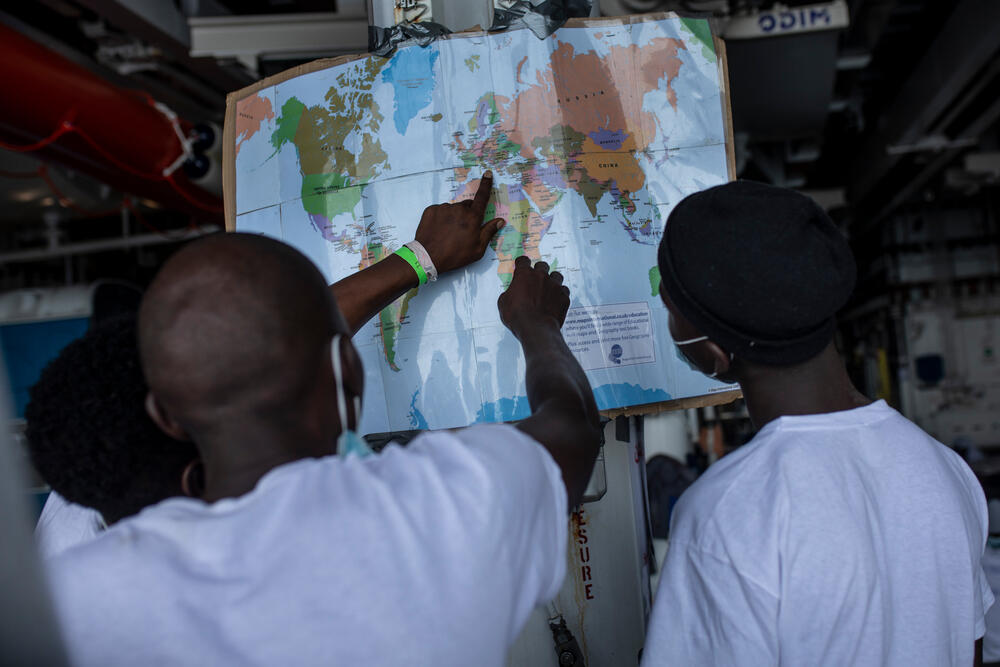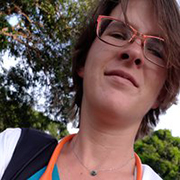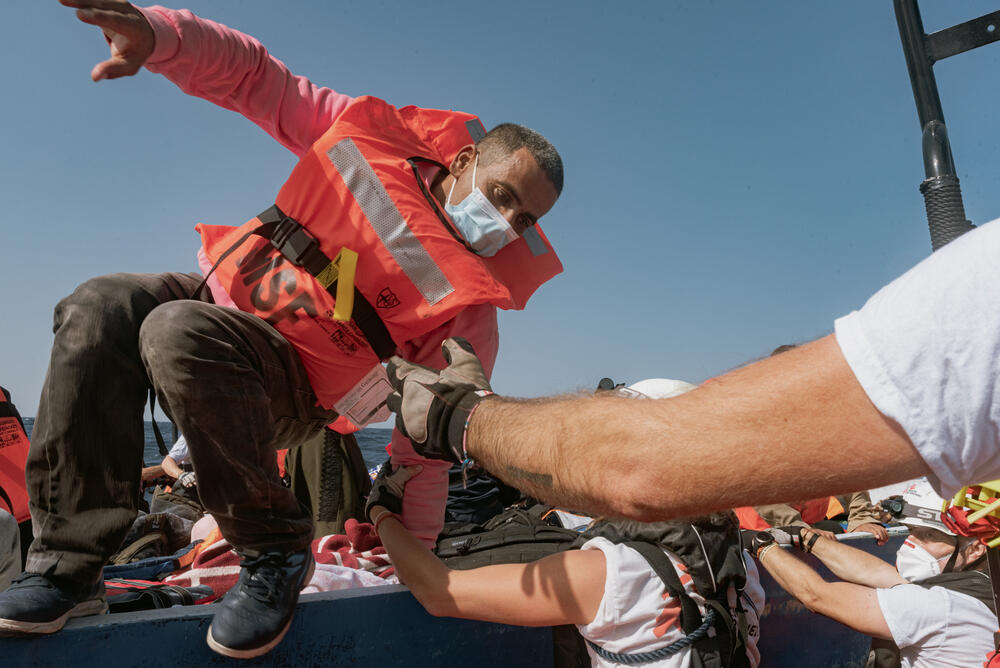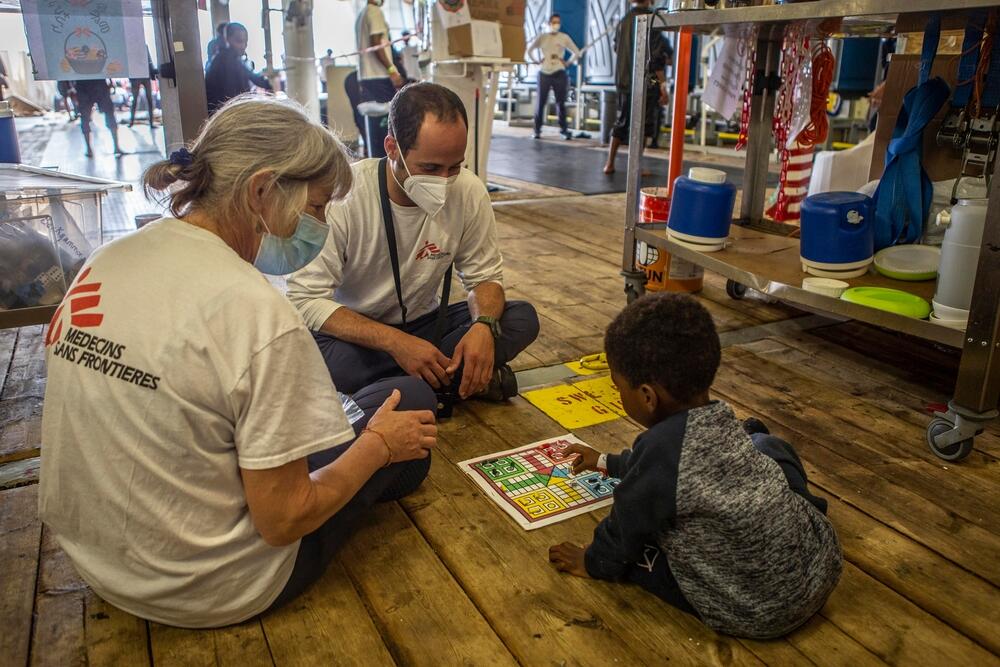Mediterranean search and rescue: "We clean their wounds, we hear their stories"
Dr Ayla Emminck shares her experience of a very human and deeply emotional assignment on board the search and rescue ship Geo Barents.
For a few months now, I have been on board the Geo Barents, performing search and rescue with Médecins Sans Frontières / Doctors Without Borders (MSF).
We have been fulfilling our duties under international maritime law, but to other minds this makes us trouble-making criminals.
For me it is very simple. When I hear the screams of people who are surrounded by metre-high black waves, when I see their faces as they are pulled to safety, there is no doubt about the justification of this act.
Women crying in my arms and men kissing the wooden deck of our vessel. Survivors applauding and cheering for newly rescued people as they come on board. Prayers in all languages and all directions of the wind.
We are all humans.
An emotional connection
This is not the first time I’ve worked in search and rescue. For years now, I have been involved, on different ships with different non-governmental organisations (NGOs), but always with the same goal.
Knowing the dangers more and more, having experienced many different situations, not all with an equally good end, has made my emotional connection to the work stronger.
“We can clean people's wounds, treat their ailments, but equally or more importantly, learn their names and hear their stories”
Not in a way that affects my professionalism, but in the sense that these days I cry with joy when a rescue unfolds without complications, and everyone is safely on board our vessel.
That moment is only a fragment of our work though.
It is usually preceded with an intense period of searching, through binoculars and on radar, following relevant updates on radio, airband and e-mail to find potential boats in distress.
Horrific returns
These days (or weeks) of searching can be challenging and frustrating, especially as we witness more and more boats being intercepted by the Libyan coastguard.
To be clear: when boats are intercepted by the Libyan coastguard it at least means that people survive and don’t drown in a shipwreck, which happens on a regular basis.
However, being intercepted means people are brought back to the horrors they have tried to escape. Being an undocumented migrant in Libya is enough reason to be detained indefinitely without even prosecution, often in unspeakably grim circumstances.
Care on board
In recent years, we have faced long delays in states assigning us a "Place of Safety": a port where rescued people can disembark. This means that not only the rescue itself, but also the care on board afterwards has grown more and more important.
Working as a doctor I can say that our onboard clinic is the first time in months or even years many of our patients have had access to medical services.
Not all the problems they bring is equally acute, but one of our biggest achievements is that we give each patient our time and attention and are able to see people as individuals.
We can clean their wounds, treat their ailments, but equally or more importantly, learn their names, hear their stories and see them for who they are.
One man from Cameroon explained to me how important this is, ‘not only have you rescued us from drowning, but also you were kind to us, you were the first one that let me smile after months’.

Help us prepare for the next emergency
Unspoken stories
Some people don’t have much to tell. Maybe they are not ready, or they simply do not want to talk. Others overwhelm me with the full history of their journey, when all they said they wanted was a painkiller.
Some open up after a longer time on board, once they have slept, some of the stress has left their bodies or when we have got to know them a bit and they have gained trust in us.
“This situation needs a larger systemic solution that lies beyond our scope of influence as humanitarian aid workers”
Some stories don’t need words to tell them. Many times, examining patients, I have seen traces of cigarette burns, ropes, badly healed fractures. These marks leave very little room for questions.
Some combinations of scars tell me clearly that the men, boys even, have been tortured. And not by exception, almost by rule.
Survivors speaking out
I want their stories and their suffering to be seen and heard, not go unnoticed. Yet I’m afraid they will be reduced to victims of the horrors they underwent. They are so much more and so much stronger than that.
The man who was my patient this morning might be running the barber saloon this afternoon, when we bring out the electrical shaving kit.
My patient of the afternoon might be the tamtam player after sunset.
The shy boy in the waiting room could be leading today’s exercise session, helping everyone stretch out cramped limbs.
One young man was cleaning the toilets with me yesterday.
As the crew, we talk to the people on board and ask if they would like to share their experiences publicly, to help MSF speak out about what’s happening here. For those who do, we take their testimonies, recording what they have been through so that they can make their voices heard.
"Bon gionno"
I’m crying inside, but at the same time I want to scream.
I’m doing basic Italian classes with the kids. After days of waiting we have been allowed to bring the people we rescued to an Italian port, but we still have some nautical miles to cross and it will take us some hours to reach.
A three-year-old with irresistible eyes is the first to pick up some words.
"Bon gionno" he yells at everyone passing us.
His pronunciation might not be perfect, but I’m pretty sure that with his smile he’ll get away with it. I wish the world could see him, his existence would matter to people. I wish I, or anyone, knew what to do or say to make people realise that something needs to change, this tragedy needs to end.
I don’t scream. We continue the lesson with "ciao", "grazie" and "te amo" (on request of his older sister).
I finish my shift and go outside, watch the last moments of the sunset out on the top deck of the ship. The wind is cold on my face.
A systemic solution
As a doctor, as a team member, but most of all as a human being, this is not just a job for me.
It feels like a vocation, even if everything we can do seems too small, at least to bear witness and to make a statement with our actions and our presence.
The last years have proven that the mere act of saving lives and speaking out is not enough. No matter how many NGO vessels are out there, there will always be more lives to save. This situation needs a larger systemic solution that lies beyond our scope of influence as humanitarian aid workers.
Working in search and rescue has beyond any doubt given me the most rewarding experiences of my life, yet at the same time contributed to the most heartbreaking moments.
As darkness falls, I am leaning over the railing alongside the sleepless. Like most nights on the Mediterranean, we are rewarded with the moon reflecting on the waves and an amazing night sky.
I wish for the moment when teams like ours will no longer be needed here.
MSF and Mediterranean search and rescue
Every year, thousands of people flee violence, insecurity, and persecution. They attempt a treacherous journey via North Africa and Turkey, in an attempt to cross the Mediterranean to reach Europe.
And every year, countless lives are lost on these journeys. In the first seven months of 2021, it's estimated that over 1,000 people drowned while attempting to cross the Mediterranean.



